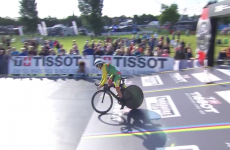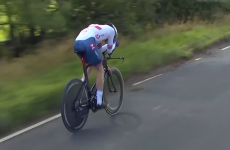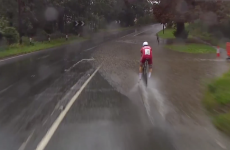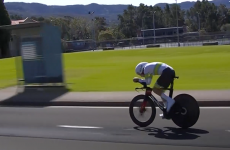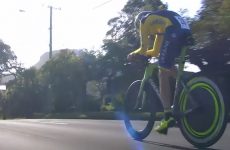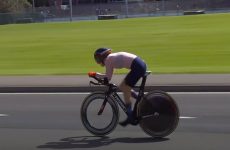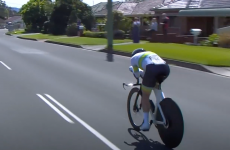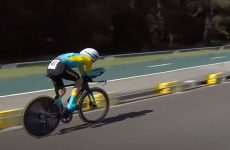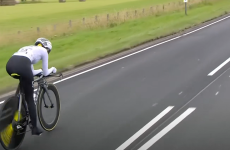Description
September 25, 2021
World Championships 2021 – ME – Antwerp – Leuven : 268,3 km
The UCI Road World Championships have been around since 1921 but for the first six years the event only consisted of a Men’s Amateur Road Race.
Show more...
September 25, 2021
World Championships 2021 – ME – Antwerp – Leuven : 268,3 km
The UCI Road World Championships have been around since 1921 but for the first six years the event only consisted of a Men’s Amateur Road Race. The first professional World Championships took place in 1927 in Nürburgring, Germany. The amateur road race continued to run alongside the professional race up until 1995 when it was then replaced with the more familiar U-23 event. Jerseys are an integral part of cycling, both as a sport and as a culture. Not only do they indicate a rider’s team affinity or national colours, they also denote achievement and accomplishment too. Wearing the rainbow bands of World Champion is perhaps the highest honour and achievement one can attain in the sport. This year’s UCI Road World Championships is set to be one of the toughest events in recent times. Held in Flanders, Belgium, the 2021 courses are some of the most attritional we’ve seen for a decade and should therefore favour the pure Classic specialists and born Flandriens.
In one of the most memorable races in recent years, Julian Alaphilippe (France) astonishingly defended his title, and will wear the famous rainbow bands of the world champion for the second consecutive year.
Behind, Dylan van Baarle (Netherlands) finished second and Michael Valgren (Denmark) collected the bronze medal. A photo-finish denied Jasper Stuyven (Belgium) a spot on the podium.
His offensive began nearly 200km from the finish with the first of several French attacks as his team sought to animate the race and make it as hard as possible. Alaphilippe himself attacked with still 58km to ride, and drew out many of the other favourites who dragged themselves away as the race entered its dénouement on the final two and a half laps of the Leuven finishing circuit.
Twice, Alaphilippe attacked from this select group and twice he was brought back into the fold. An old French proverb states that there is “never two without three”, and twenty kilometres from the finish, Alaphilippe attacked for the third time on the Sint Antoniusberg. This time, no one could follow him, and he carved out a 30-second gap over his chasers, enough to celebrate as he soloed down the finishing straight.
“Last year was a dream for me,” Alaphilippe said at the finish, “it was very hard and it’s emotional. I was very motivated. I wanted to do well for the team and get the best result possible.
“The legs felt great and in the final I made the cut. This wasn’t planned. I went all out, I have no words. I thought of my little one on the final. There were many supporters for Belgium and they asked me to slow down. They weren’t sympathetic words but it gave me more motivation.”
How it unfolded
On a 268.3km course, through 42 short climbs and crowds so vast that some had taken to standing on walls, lamp posts or balconies, the race travelled from Antwerp to Leuven. Once one-and-a-half laps of the Leuven finishing circuit were completed, it was on for a lap of the hillier Flandrien circuit, four more loops of the Leuven circuit, and another Flandrien lap before two-and-a-half final laps of the Leuven circuit.
After completing the long, neutralised zone through Antwerp, the race seemed to pause at the flag drop, perhaps in a collective drawing of breath, preparing for the chaos about to unfold.
The peloton lined itself out across the road, entered a tunnel and, then, as it emerged out the other side, Rory Townsend (Ireland) launched the first attack. His move failed, as did the subsequent counter-attacks and for the opening 10 kilometres the peloton remained a stubborn gruppo compatto, despite repeated attempts to form a breakaway.
Eventually, a group did escape. Townsend formed one-eighth of the move; he was joined by Jose Tito Hernandez (Columbia), Joel Burbano (Ecuador), Pavel Kochetkov (Russian Cycling Federation), Patrick Gamper (Austria), Oskar Nisu (Estonia), Kim Magnusson (Sweden) and Jambaljamts Sainbayar (Mongolia). Others looked to join them, but anxious to only allow a breakaway of manageable size to escape, Great Britain, Belgium and Denmark moved to block the road.
As the gap ballooned to six minutes, Tim DeClercq (Belgium) established himself on the front of the peloton where he shared the pace setting with Denmark, and the race settled into a short-lived, placid rhythm.
Even this more sedate stage of the day was punctuated by incident. Ethan Hayter (Great Britain) crashed on the approach to the first climb while shortly afterwards Matteo Trentin (Italy), Davide Ballerini (Italy) and Mads Pedersen (Denmark) collided at the back of the peloton.
Displaying their offensive strategy, France then launched their first attack of the day with 200km still to race. Twenty kilometres later, they attacked again through Anthony Turgis. He was shut down by DeClercq and brought back into the peloton. Another of the French riders, Benoît Cosnefroy then attacked on the first ascent of the Smeysberg, as the race entered the Flandrien circuit.
Remco Evenepoel (Belgium) and Magnus Cort (Denmark) joined him, and a gap emerged as Belgium blocked the peloton’s path on the narrow, cobbled climb. They remained out front as, behind them, the race exploded.
First, the peloton split on a flat, exposed section of the course, forcing Italy to chase back on. Then, on the Taymanstraat 174km from the finish, Stefan Bissegger (Switzerland) attacked and drew out an exceptionally strong group composed of representatives from multiple nations.
Only Italy had missed this move and, as this new group bridged across to Cosnefroy, Evenepoel and Cort, the gravity of their task became ominously clear for it contained many of the biggest names in cycling. Kasper Asgreen (Denmark), DeClercq, Brandon McNulty (USA), Pascal Eenkhoorn (Netherlands), Arnaud Démare (France), Primož Roglič (Slovenia), Ben Swift (Great Britain), Imanol Erviti (Spain), Bissegger, Nathan Haas (Australia), Jan Tratnik (Slovenia), and Markus Hoelgaard (Norway) present with Cort, Cosenfroy and Evenepoel.
By the time the race settled again, this group had a minute’s advantage over the peloton and another frantic chase for Italy ensued, led by the wounded Ballerini and Trentin. Helped by the fractious nature of the front group, only Asgreen and Evenepoel seemed committed, the gap began to fall so that as the race re-entered the Leuven circuit just 22 seconds separated these two groups.
After 40 kilometres of furious racing, the peloton finally caught this group on the first lap of the Leuven circuit, and the early breakaway was mopped up too.
As soon as the race regrouped, it split again; this time on wide, flat roads and Mathieu van der Poel (Netherlands) was caught in the wrong group. Though the peloton came back together again, attacks came thick and fast with the peloton so stretched out that it was only three riders abreast at its widest point.
Finally, still 92km from the finish, the elastic snapped and a small group containing Evenepoel, Andrea Bagioli (Italy), Ivan Cortina (Spain), Valentin Madouas (France), Rasmus Tiller (Norway), Robert Stannard (Australia), Mads Schmidt (Denmark), Tratnik, Dylan Van Baarle (Netherlands), Nils Politt (Germany) and Nielsen Powless (USA).
This time, Great Britain were forced to take initial responsibility for the chase as the gap reached 40 seconds at the entry to the Flandrien circuit. Such was the fierce pace that 90 riders – about half the field – had abandoned by this point.
On the longer climbs of the Flandrien circuit, various attacks were launched from the peloton in an attempt to join the leading group. Only an acceleration from Alaphilippe could accomplish this, with pre-race favourite Wout van Aert (Belgium) stuck to his back wheel. A group containing most of the contenders, though stripped of Asgreen and Peter Sagan (Slovakia), followed them and bridged across to the front group, 58 kilometres from the finish.
As the gap hovered precariously at 15 seconds, Evenepoel sat on the front and dragged the front group away from the peloton. Alaphilippe attacked once more on the Smeysberg but he was caught by the group shortly afterwards. To deter further attacks, Evenepoel lifted the pace and remained on the front until 25 kilometres from the finish.
Once Evenepoel had exhausted his energy reserves, however, Van Aert and Belgium were vulnerable to attacks; a vulnerability that Alaphilippe exploited.
On the Wijnpers climb, nearly obscured by the multi-coloured forest of flags that lined the road, Alaphilippe, set up by Madouas, attacked for the first time forcing van Aert himself to chase back on. His second attempt was also unsuccessful but his third attack distanced the remaining contenders.
A small group comprised of Valgren, Stuyven, Powless and Van Baarle formed behind him, but they were unable to erode Alaphilippe’s advantage which grew in the final 20 kilometres, reaching 32 seconds by the finish.
Results :
1 Julian Alaphilippe (France) 5:56:34
2 Dylan van Baarle (Netherlands) 0:00:32
3 Michael Valgren Hundahl (Denmark)
4 Jasper Stuyven (Belgium)
5 Neilson Powless (United States Of America)
6 Thomas Pidcock (Great Britain) 5:57:23
7 Zdenek Stybar (Czech Republic) 5:57:40
8 Mathieu van der Poel (Netherlands) 5:57:52
9 Florian Senechal (France)
10 Sonny Colbrelli (Italy)
11 Wout van Aert (Belgium)
12 Markus Hoelgaard (Norway)
13 Valentin Madouas (France)
14 Matej Mohoric (Slovenia) 6:00:34
15 Giacomo Nizzolo (Italy) 6:00:39
16 Nils Politt (Germany) 6:01:59
17 Guillaume Boivin (Canada)
18 Jan Polanc (Slovenia)
19 Benoit Cosnefroy (France) 6:02:04
20 Victor Campenaerts (Belgium)
21 Alexander Kristoff (Norway) 6:03:01
22 Mike Teunissen (Netherlands)
23 Ivan Garcia Cortina (Spain)
24 Diego Ulissi (Italy)
25 Michael Matthews (Australia)
26 Peter Sagan (Slovakia)
27 Dylan Teuns (Belgium)
28 Sebastian Schoenberger (Austria)
29 Bauke Mollema (Netherlands)
30 Luka Mezgec (Slovenia)
31 Tiesj Benoot (Belgium)
32 Petr Vakoc (Czech Republic)
33 Sven Erik Bystroem (Norway)
34 Vegard Stake Laengen (Norway)
35 Ethan Hayter (Great Britain)
36 Michal Kwiatkowski (Poland)
37 Tadej Pogacar (Slovenia)
38 Patrick Gamper (Austria)
39 Rui Oliveira (Portugal)
40 Artem Nych (Russian Cycling Federation) 6:03:05
41 Stefan Kueng (Switzerland)
42 Gorka Izagirre Insausti (Spain)
43 Imanol Erviti (Spain)
44 Gonzalo Serrano Rodriguez (Spain)
45 Silvan Dillier (Switzerland)
46 Cesare Benedetti (Poland)
47 Joao Almeida (Portugal)
48 Primoz Roglic (Slovenia)
49 Yukiya Arashiro (Japan)
50 Merhawi Kudus (Eritrea)
51 Rasmus Tiller (Norway)
52 Emils Liepins (Latvia)
53 Carlos Rodriguez Cano (Spain) 6:03:13
54 Michael Gogl (Austria) 6:03:14
55 Nelson Oliveira (Portugal)
56 Arnaud Demare (France) 6:03:22
57 Lawson Craddock (United States Of America) 6:03:23
58 Gianni Moscon (Italy) 6:03:26
59 Roger Adria Oliveras (Spain) 6:03:38
60 Toms Skujins (Latvia) 6:03:41
61 Yves Lampaert (Belgium) 6:03:56
62 Remco Evenepoel (Belgium)
63 Fabian Lienhard (Switzerland) 6:12:17
64 Jhoan Esteban Chaves Rubio (Colombia)
65 Nelson Soto Martinez (Colombia) 6:13:52
66 Pascal Eenkhoorn (Netherlands)
67 Nikias Arndt (Germany)
68 Georg Zimmermann (Germany)
DNF Andrea Bagioli (Italy)
DNF Nicholas Schultz (Australia)
DNF Connor Swift (Great Britain)
DNF Remi Cavagna (France)
DNF Jan Tratnik (Slovenia)
DNF Kasper Asgreen (Denmark)
DNF Michal Golas (Poland)
DNF Robert Stannard (Australia)
DNF Alessandro de Marchi (Italy)
DNF Christophe Laporte (France)
DNF Anthony Turgis (France)
DNF Maciej Bodnar (Poland)
DNF Tim Declercq (Belgium)
DNF Mads Wuertz Schmidt (Denmark)
DNF Jake Stewart (Great Britain)
DNF Ben Swift (Great Britain)
DNF Caleb Ewan (Australia)
DNF Magnus Cort Nielsen (Denmark)
DNF Sergei Chernetskii (Russian Cycling Federation)
DNF Mikkel Bjerg (Denmark)
DNF Lukasz Owsian (Poland)
DNF Pavel Kochetkov (Russian Cycling Federation)
DNF Antoine Duchesne (Canada)
DNF Petr Rikunov (Russian Cycling Federation)
DNF Barnabas Peak (Hungary)
DNF Jambaljamts Sainbayar (Mongolia)
DNF Nickolas Zukowsky (Canada)
DNF Jack Bauer (New Zealand)
DNF Igor Boev (Russian Cycling Federation)
DNF Michael Schaer (Switzerland)
DNF Fernando Gaviria Rendon (Colombia)
DNF Lucas Eriksson (Sweden)
DNF Mikkel Honore (Denmark)
DNF Oskar Nisu (Estonia)
DNF Nathan Haas (Australia)
DNF Stefan Bissegger (Switzerland)
DNF Marco Haller (Austria)
DNF Evaldas Siskevicius (Lithuania)
DNF Brandon McNulty (United States Of America)
DNF Matteo Jorgenson (United States Of America)
DNF Harrison Sweeny (Australia)
DNF Fred Wright (Great Britain)
DNF Kim Magnusson (Sweden)
DNF Josef Cerny (Czech Republic)
DNF Juraj Sagan (Slovakia)
DNF Karl Patrick Lauk (Estonia)
DNF Pascal Ackermann (Germany)
DNF Sebastian Langeveld (Netherlands)
DNF Juan Sebastian Molano Benavides (Colombia)
DNF Alvaro Jose Hodeg Chagui (Colombia)
DNF Yuriy Natarov (Kazakhstan)
DNF Rory Townsend (Ireland)
DNF Clement Russo (France)
DNF Polychronis Tzortzakis (Greece)
DNF Reinardt Janse van Rensburg (South Africa)
DNF Stanislaw Aniolkowski (Poland)
DNF David Per (Slovenia)
DNF Luke Rowe (Great Britain)
DNF Antonio Jesus Soto Guirao (Spain)
DNF Eder Frayre Moctezuma (Mexico)
DNF Ryan Mullen (Ireland)
DNF Robin Carpenter (United States Of America)
DNF Pier Andre Cote (Canada)
DNF Martin Laas (Estonia)
DNF Krists Neilands (Latvia)
DNF Jose Tito Hernandez Jaramillo (Colombia)
DNF Andre Rodrigues de Carvalho (Portugal)
DNF John Degenkolb (Germany)
DNF Quinn Simmons (United States Of America)
DNF Anatolii Budiak (Ukraine)
DNF Oscar Riesebeek (Netherlands)
DNF Franklin Archibold Castillo (Panama)
DNF Benjamin Perry (Canada)
DNF Aleksandr Riabushenko (Belarus)
DNF Domen Novak (Slovenia)
DNF Michael Kukrle (Czech Republic)
DNF Patrik Tybor (Slovakia)
DNF Dawit Yemane (Eritrea)
DNF Martin Pluto (Latvia)
DNF Shane Archbold (New Zealand)
DNF Matteo Trentin (Italy)
DNF Davide Ballerini (Italy)
DNF Marc Hirschi (Switzerland)
DNF Ryan Gibbons (South Africa)
DNF Danny van Poppel (Netherlands)
DNF Luke Durbridge (Australia)
DNF Dmitrii Strakhov (Russian Cycling Federation)
DNF Connor Brown (New Zealand)
DNF Natnael Berhane (Eritrea)
DNF Mark Cavendish (Great Britain)
DNF Alex Aranburu Deba (Spain)
DNF Edward Dunbar (Ireland)
DNF Rigoberto Uran (Colombia)
DNF Erik Baska (Slovakia)
DNF Hugo Houle (Canada)
DNF Oleksandr Prevar (Ukraine)
DNF Yevgeniy Gidich (Kazakhstan)
DNF Odd Christian Eiking (Norway)
DNF Metkel Eyob (Eritrea)
DNF Sergio Andres Higuita Garcia (Colombia)
DNF Jayde Julius (South Africa)
DNF Sebastian Novoa (Ecuador)
DNF Bayron Guama (Ecuador)
DNF Miles Scotson (Australia)
DNF Andreas Kron (Denmark)
DNF Ylber Sefa (Albania)
DNF Mads Pedersen (Denmark)
DNF Maximilian Schachmann (Germany)
DNF Alex Kirsch (Luxembourg)
DNF Tom Scully (New Zealand)
DNF Joel Burbano Coral (Ecuador)
DNF Orluis Alberto Aular Sanabria (Venezuela)
DNF Rafael Reis (Portugal)
DNF Wilson Haro (Ecuador)
DNF Eduard-Michael Grosu (Romania)
DNF Cristian Pita (Ecuador)
DNF Antonio Eric Fagundez Lima (Uruguay)
DNF Norman Vahtra (Estonia)
DNF Andrii Kulyk (Ukraine)
DNF Dmitriy Gruzdev (Kazakhstan)
DNF Mykhaylo Kononenko (Ukraine)
DNF Gustav Basson (South Africa)
DNF Daniil Fominykh (Kazakhstan)
DNF Sarawut Sirironnachai (Thailand)
DNF Kevin Geniets (Luxembourg)
DNS Alexis Quinteros (Ecuador)

![World Championships 2021 – Road Race [FULL RACE]](/wp-content/uploads/2021/09/World-Championships-2021-–-Road-Race-FULL-RACE.png)










